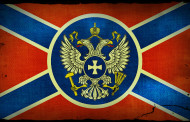Syrian rebels in northern Syria have come under an intense week-long bombing campaign by Russian warplanes. The insurgents, who also have been trying to hold on in the face of a coordinated ground offensive by forces loyal to President Bashar al-Assad, have sheltered in tunnels or taken cover in blast craters. One young rebel fighter told VOA about his ordeal and why he and many other fighters are withdrawing from the front.
For almost a quarter of his young life, 20-year-old Ahmad has been a fighter, but the fight has gone out of him. After enduring 400 airstrikes in four days in the villages of the northern countryside of Aleppo, where a devastating Syrian government offensive has been pressed, he withdrew from the frontline along with a hundred of his comrades.
He said morale has dropped to rock bottom and militia commanders are trying to boost the confidence of the fighters. There is talk of forming a new Aleppo army, uniting the more moderate, less religious-based militias aligned to the Western-backed Free Syrian Army.
When the warplanes paused their bombing runs, there were skirmishes with combatants clashing just meters from each other.
“The first day, the fight, it is easy. After that the second days and the third it was very difficult. We lost a lot of people, a lot of friends, a lot of fighters,” he said.
And the fourth day? The Russian warplanes razed everything in a three kilometer area. He told VOA that on the fourth day he was at the front, in a chain of villages north of the city of Aleppo, there were more than 400 airstrikes.
He said the fighters and civilians alike hid in tunnels dug before the offensive and in bomb craters. He said they could feel and hear the percussion of blasts. And the heat as well. At one point he said they examined themselves quickly to make sure they had not been hit. Everything was being thrown at them — missiles, barrel bombs and sea-mines, as well as vacuum and cluster bombs. He said they became expert at distinguishing from the impact what had been fired at them.
A short young man, with dark eyes and black hair, he hardly has the need to shave yet. He flicks a cigarette nervously as we talk. When I ask him why he left on the fourth day, he goes quiet. There is a long pause.
He said that he and about another 100 fighters from the militia Nour al-Din al-Zenki withdrew not because of fear but because they felt they had been betrayed, let down by everybody who claimed to be the friends of Syria, meaning the U.S. and the West and Gulf countries as well as their own commanders.
He said the commanders of the Free Syrian Army militias and the hardline Islamist brigades, as well as al-Qaida’s affiliate Jabhat al-Nusra, should have set their differences aside and unified. Now it may be too late.
SPECIAL EDITION/ MORE FROM THE FRONT ~ The sweeping Russian-backed offensive in northern Syria by President Bashar al-Assad’s military and foreign fighters from Iran, Lebanon and Afghanistan is triggering a humanitarian crisis by propelling thousands of civilians to flee to the Turkish border, say political activists and rebel commanders.
The daunting offensive is altering dramatically the balance of insurgent forces in the north of the country to the benefit of al-Qaida-linked groups and the Islamic State, they say.
Some forecast an implosion of secular and less religious-based militias aligned with the Western-backed Free Syrian Army (FSA) in northern Syria. “This is the end of the FSA in northern Syria,” Bassam al-Kuwaiti, a well-known figure in political opposition circles, told VOA.
Al-Kuwaiti said some moderate militias will be forced to merge; others will have no alternative but to disband altogether and join either the powerful Islamist insurgent group Ahrar al-Sham, [Free Men of Syria] or enlist with al-Qaida’s affiliate in Syria, Jabhat al-Nusra.
“They will have no other option,” he said.
Al-Qaida’s affiliate and Ahrar al-Sham are partners in an alliance known as Jaysh al-Fatah, or Army of Conquest, and have recently debated formally merging.
In villages and towns northwest and north of Aleppo, FSA militias are already relying on Ahrar al-Sham and al-Nusra to help them to try to survive a week-long Assad onslaught that has seen Russian warplanes fly hundreds of round-the-clock bombing sorties.
Assad forces have managed to capture a chain of villages that control the main rebel supply route for insurgent-held districts in Aleppo city.
“The situation is disastrous,” said rebel fighter Abu Zaid, who had just returned to Turkey from the front-lines. “The Russians are flying six-plane sorties and we are being bombarded by artillery and coming under multiple rocket attacks.”
Several rebel commanders say most of the ground forces against them consist of foreign Shi’ite fighters from Lebanon’s Hezbollah movement and from Afghanistan as well as members of Iran’s Revolutionary Guards.
U.S. officials have told VOA Russian commandos, or Spetsnaz, are also in the regime’s mix of forces and have been working covertly around Aleppo.
But Zakaria Malahefji, the political officer of the 3,000-strong Fastaqim Kama Umirt, a brigade aligned to the rebel alliance Jaish al-Mujahideen (Army of Holy Warriors), said they had not spotted Russians on the ground and few Syrian soldiers.
“You hardly see Syrian army troops fighting,” Malahefji said. “We are fighting Iranians, Afghans and Hezbollah.”
He was bitter about what he sees as a Western desertion of the Syrian revolution.
“I have spoken with the ambassadors and their staffs of the U.S., Britain and France and asked them, ‘What will you do other than just makes statements?’ ”
He offered a message from a U.S. official that read: “God willing, we are working on changing the conditions on the ground in the next few weeks.”
“But we don’t have weeks,” snapped Malahefji, a former higher education teacher. “We need portable anti-aircraft missiles if we are to persevere” he said. “And we need more anti-armor missile systems like anti-tank TOW missiles.”
In the complex and multisided conflict in northern Syria, all nongovernment players are jockeying to survive or to take advantage of the sudden dramatic shift of battlefield fortunes.
The position of the Kurdish YPG, or People’s Protection Units, which is dominated by Syria’s Democratic Union Party (PYD), appears the most tortuous. Rebel commanders accuse the YPG of being two-faced.
Around the mainly Kurdish enclave of Afrin, YPG fighters have started to coordinate with rebel factions to keep open a humanitarian corridor for displaced Syrians from northern towns and villages who are stuck on the Syrian-Turkish border near the Bab al-Salamah border crossing close to the Syrian town of Azaz.
Turkey, despite claiming it has an “open-border policy,” has not been allowing refugees to cross.
YPG and rebel factions have been protecting civilians as they travel from Azaz. But at the same time the YPG has launched attacks on Islamist and moderate rebel factions around Afrin, seeking to expand the Kurdish enclave.
Russian airstrikes on Saturday helped Kurdish fighters alongside militiamen from Jaysh al-Thwar, a YPG Sunni Arab ally, to capture the strategic Tal Zinkah hill north of Aleppo.
Syrian rebels argue the YPG, the most effective ground partner for the U.S.-led international coalition fighting Islamic State militants, is a secret partner of Assad and directly and indirectly coordinates with Damascus. YPG commanders have always denied the claim.
In an exclusive phone interview with VOA, PYD leader Salih Muslim echoed Assad and Russian officials.
“The Russian airstrikes are targeting terrorists, Ahrar al-Sham and Jabhat al-Nusra,” Muslim said. “The offensive won’t impact Syrian Kurds.”
Western analysts also warn the Assad offensive will weaken rebel moderate factions and force fighters to throw their lot in with the larger and more militant groups.
“The renewed pressure being placed upon the opposition also risks driving opposition groups to deepen their coordination with Syrian al-Qaida affiliate Jabhat al-Nusra and other Salafi-jihadist factions,” cautioned Christopher Kozak, an analyst at the Institute for the Study of War, a Washington-based think tank.
comments powered by HyperComments



